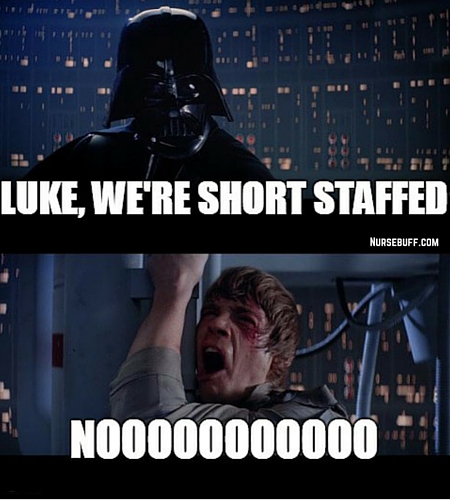Short staffing in nursing isn’t a new issue. However, today’s shortage is a lot worse than the past years. In fact, by 2024, it’s expected that there will be more than a million registered nurse openings. With such crisis, some hospitals will soon be forced to cancel surgeries, deny patients, and close beds.
If you are in doubt about your unit’s nurse-patient ratio, here are 4 signs that your unit is short on staff.
Medication errors

If there’s one thing a lot of nurses greatly fear, it’s committing medication error.
You see, when you give out the wrong drug to the right patient or the right drug to the wrong patient, it’s either the patient gets worse or he develops another problem. And you know what else?
You can also get sued or worse, your license can get revoked.
Pretty scary, right?
Imagine having to care for 10 or 15 patients at a time, with each of them having 10 medications. You’ll have to spend a lot of time making sure each patient gets the right drug at the right time.
With so little time, it’s easy to get things mixed up and that’s where medication errors can happen. If you see more and more nurses in your area committing such errors, it’s probably the right time to assess your staffing plan.
What You Can Do:
Create a buddy system. This way, there’ll be one nurse who can focus on giving medications and another nurse who can attend to their patients’ other needs. If needed, they can also assist each other in doing procedures.
See Also: How to Prevent Medication Errors: 12 Effective Tips for Nurses
Higher mortality
Medication errors aren’t the only thing that happens in a short-staffed unit. Medical errors can also occur.
And there are studies to back that up. You can see this and this.
In a short-staffed nursing unit, nurses are forced to spend less time providing care to their patients. This means not having enough time to properly assess, teach, and treat them.
If ever they do get the time to perform those nursing activities, there’s a good chance that the quality of care they provide is low because they’ll be in a rush to attend to all their patients’ needs.
What You Can Do:
Manage your time wisely and learn how to prioritize your tasks. Do the most important tasks first to make sure that you don’t end up compromising your patient’s health.
One thing you can do to make sure you prioritize your tasks right is to take note of all the things you need to do. Ask yourself which of those tasks you need to do first and why. Determine which tasks can lead to serious outcomes if not done right away. In addition to those things, it’s also essential that you know which is more important to your patients.
Decreasing patient and nurse satisfaction

When you’re in a big rush, it can easily make your patients feel anxious and uncared for. And when you’re not able to answer their call lights right away, they’ll think you’re no good.
Admit it or not, your presence means a lot to your patients. When they feel like they can’t count on you to care for them, they can easily feel dissatisfied. You may even lose their trust if they feel like you don’t have time for them.
Leaving tasks undone and patients’ needs unmet, on the other hand, can create this moral and role conflict in you. Over time, those two things can make you less satisfied with your job, forcing you to quit or change career.
What You Can Do:
Even if you’re in a hurry, try not to appear that way to your patients. As much as possible, smile and greet your patients. These are simple gestures that can make them feel acknowledged and valued. Show empathy to assure your patients that you are listening and make sure to listen without interrupting them.
Increasing workplace injuries
If the number of nurses on the floor is low, it will be impossible to have two of them lift a single patient. One of them will have to do the job alone and this means being at risk of injuries. These injuries can contribute to reduced productivity, disabilities, and lost time at work which can worsen the effects of short staffing.
What You Can Do:
Ask for help and learn how to delegate. There are nursing assistants and other health care personnel that can help you with your tasks. Try to utilize your hospital’s assistive equipment and devices, too. They are a great help in reducing hazards that can cause back pain and other injuries.
See Also: 5 Crucial Tips for Patient Safety Week




















